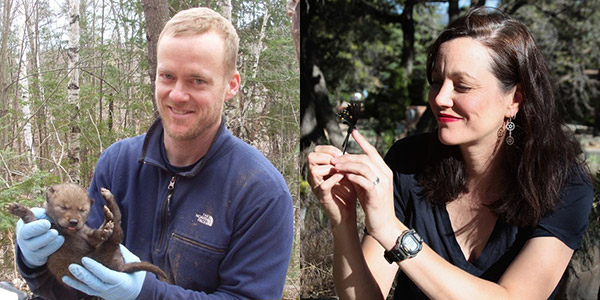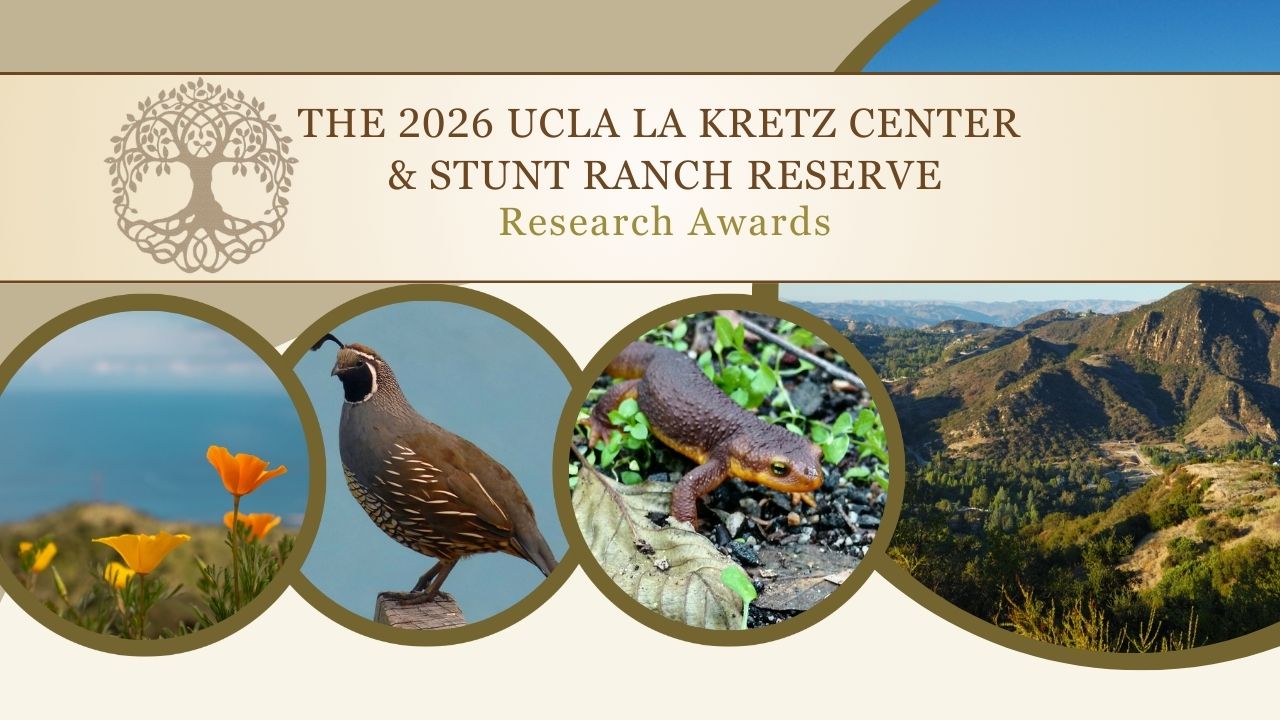
From big cats to delicate butterflies, the La Kretz Center’s newest researchers are surveying California wildlife
John Benson and Elizabeth Long are the 2014 UCLA La Kretz Center Fellowship appointees
John Benson and Elizabeth Long are the 2014 La Kretz Center Fellowship appointees
With a focus on the wild and urban landscapes of the Santa Monica Mountains, two postdoctoral scholars join a community of scientists doing cutting-edge conservation research. The UCLA La Kretz Center for California Conservation Science postdoctoral initiative provides funding to support early-career researchers as they engage in efforts over the span of two years to protect California’s biodiversity and ecosystems.
Educational and professional endeavors have taken John Benson many places: studying wildlife in Northern California, earning a graduate degree while helping to reintroduce the federally threatened Louisiana black bear, and completing a Ph.D. program and investigating hybridization between wolves and coyotes in Canada.
Field studies found him capturing polar bears on the sea ice of Alaska, tracking lynx in Maine, and serving as a research scientist with the Florida Fish and Wildlife Conservation Commission, studying the endangered Florida panther. Prior to accepting the fellowship Benson was analyzing predator-prey interactions between moose, wolves, and bears for the Alaska Department of Fish and Game.
Following butterfly pathways is Elizabeth Long’s passion. “Butterflies are an excellent study system for understanding how evolutionary forces, ecological factors, and genetics contribute to shape communities, populations, and individual organisms. From a conservation perspective, they are a great umbrella species — by preserving them we are by default preserving plants and other insects that share the same habitat, and in many cases other types of animals benefit as well,” she said.
Postdoctoral fellows at the La Kretz Center are matched with a partner organization on research projects. Along with National Park Service scientists, Benson will conduct a long-term study on mountain lions and bobcats at the urban-wildland interface of the Santa Monica Mountains.
The group will be testing theories regarding the effects of both positive (wildlife highway crossings) and negative (additional habitat loss) changes to the landscape on genetic variability and extinction risk in a small, isolated population. The results will potentially lead to a better understanding of the links between behavior, genetics, and demography in a highly urbanized environment.
Long’s project involves combining field surveys and lab studies to investigate how butterfly species are distributed across the same region. Butterfly species distributions are changing in response to climate change.
In conjunction with the Natural History Museum of Los Angeles County (NHMLA) she will attempt to reconstruct the historic distribution of butterfly species in the Santa Monica Mountains. Working with the Entomology Department Staff she will go through museum archives and collections as well as published information from earlier butterfly researchers to gauge how widely distributed and how abundant certain species were.
Long said, “I’m excited to be involved in the work that’s being carried out by the La Kretz Center. I really like the flexibility of this fellowship — there are very few programs that let the researcher propose her own project. This fellowship offers a lot of independence and working with the NHMLA staff has been a very rewarding component.”
“The mission of the La Kretz Center, to provide scientific research that informs management actions and conserves and restores California’s environment, fits very well with my own goals. I’ve become increasingly disturbed by the prospect of losing wildlife to extinction due to human actions,” said Benson.
He continued, “I want to conduct science that will make positive contributions to the conservation of wildlife and the maintenance of functioning ecosystems.”
Postdoctoral researchers are essential to the intellectual mission of any higher education institution. The mentored research and scholarly training offered by a postdoctoral fellowship is a step towards acquiring the professional skills needed to pursue a career path.



